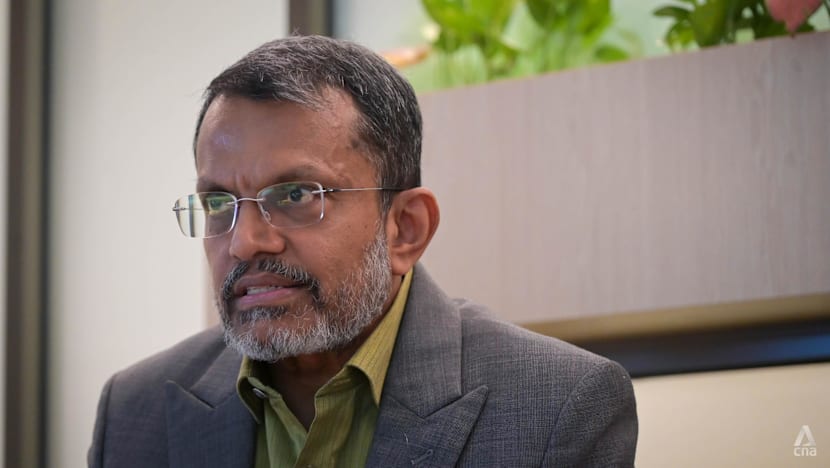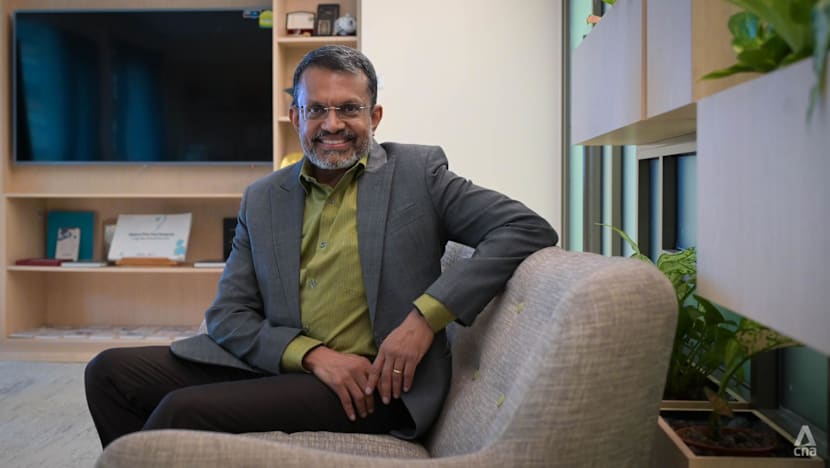World will be forced to confront climate change in next 10 to 20 years: Singapore's Ravi Menon
Singapore's first climate ambassador says political momentum on climate action has slackened globally, but those in the field remain committed.

Singapore's Ambassador for Climate Action Ravi Menon in his first interview with local media on Oct 21, 2025, since he took up the role in April 2024. (Photo: CNA/Syamil Sapari)

This audio is generated by an AI tool.
SINGAPORE: The world may be distracted by wars and cost-of-living pressures now, but climate change will become impossible to ignore within the next two decades, forcing governments to act, says Singapore's Ambassador for Climate Action Ravi Menon.
"Between the next 10 to 20 years, climate change will be one of the major preoccupations of governments, businesses and the general public. It's going to dominate all your news," Mr Menon said in his first interview with local media since taking up the role in April last year.
"So it's better to start preparing early than to be caught up in a rushed, disorderly transition which will be forced upon us."
His warning comes as political commitment to climate action slackens globally, with countries revising or abandoning targets amid competing priorities.
"If there's war going on or if cost of living is high, it's only natural to be concerned about those things," Mr Menon said. "Most countries, if you poll the people, they are strongly in support of climate action, but it has kind of dropped in priority. They say it's important, but it's not the number one issue that I'm thinking about."
Geopolitical tensions, trade disputes, energy security concerns and nationalist politics have distracted major economies from climate commitments. Some countries are revising their targets amid competing fiscal demands.
In January, the United States under President Donald Trump withdrew from the 2015 Paris Agreement signed by nearly 200 countries. More recently, Washington threatened visa restrictions and sanctions against nations supporting a UN plan to reduce shipping emissions.
Scotland scrapped its target of cutting emissions by 75 per cent by 2030, replacing annual targets with five-yearly reviews. New Zealand cut its methane reduction target in October.
Still, bright spots remain. Mr Menon pointed to London Climate Action Week and NYC Climate Week as examples of sustained commitment, adding that Singapore remains committed to climate action.
THREE PRIORITIES
Mr Menon helmed the Monetary Authority of Singapore for about 12 years before retiring in January 2024 after 36 years in public service. He took up the climate ambassador role three months later and is also senior adviser to the National Climate Change Secretariat.
As ambassador, his priorities span domestic, regional and global fronts, mirroring Singapore's national climate agenda.
Domestically, he is facilitating Singapore's transition towards net-zero greenhouse gas emissions by 2050. Internationally, he is working on collective action in carbon markets and regional energy grids, particularly to phase out coal-fired power plants.
His third priority is adaptation, which has grown more urgent as scientists worry the world is unlikely to limit global temperature rise to 1.5 degrees Celsius.
"It's quite clear that we need to double down on adaptation efforts, both as a country and ... in collaboration with other countries," he said.

Singapore faces heat stress, floods, droughts and sea level rise, but Mr Menon has learnt these issues cannot be viewed in isolation.
"We have to look at our risks in a regional and sometimes global context. For effective risk management and adaptation, we need to work with partner countries to address these spillover effects that affect all of us."
These include public health issues such as warmer climates leading to a rise in dengue or malaria, food supply and sea level rise.
He highlighted how rice production is being affected by changes to the Mekong River, Southeast Asia's longest waterway.
"Yields have been falling. Water tables are receding, and there is salination from sea water intrusion up the Mekong Delta," he said. "This is not something that Singapore can do on its own, but Singapore can be a valuable partner."
FINANCING CHALLENGES
Annual global climate finance has crossed US$800 billion but remains far short of the US$2.5 trillion needed yearly until 2030 to meet Paris Agreement goals.
The main obstacle: Returns for private investors don't match the risk.
Most governments have high levels of public debt, Mr Menon said. "Where are they going to find the resources to channel more into climate finance, climate mitigation, when they have competing needs on the social side, competing needs on defence expenditures and great challenges in raising revenues? People don't want to pay more taxes."
While private capital is sufficient, investors are unwilling to take the risk with climate projects. That's where blended finance could step in, combining government, philanthropic and private funding.
"In blended finance, you're using scarce public money and also philanthropic money to crowd in commercial capital by de-risking," he said.
Singapore's Financing Asia's Transition Partnership (FAST-P), launched by MAS in 2023, is a blended finance initiative that brings together public, private and philanthropic capital to help finance Asia’s green transition.
Its inaugural Green Investments Partnership fund has obtained US$510 million in committed capital and will invest in bio-energy and renewables projects expected to reduce more than 350,000 tonnes of emissions annually. Funds are expected to be disbursed "quite soon", Mr Menon said.
The second fund, the Industrial Transformation Programme for hard-to-abate sectors, is expected to have capital committed early next year.
Mr Menon hopes insurers can help reduce reliance on public capital by covering political and regulatory risks, though "it's still early days".
Adaptation financing faces particular hurdles, given projects are unlikely to generate revenue, Mr Menon noted.
"The challenge is always to try to design adaptation projects which generate some revenue. It may not be enough to provide the full returns that private capital wants, but at least part of it," he said.
He cited agriculture technology as an example. If rice yields are falling at a farm, adaptation financing can change irrigation methods and introduce hardier seeds to raise productivity and revenues.
Insurance is another instrument. "If premiums can come down because of the investment in adaptation, then that is, you know, in a sense, a revenue," he said.
PHASING OUT COAL
Singapore is also promoting transition credits to accelerate coal plant retirements. These high-integrity carbon credits are generated when coal plants shut down ahead of schedule and can be used by other companies to offset emissions.
The push is urgent. Globally, coal use hit record highs in 2024. Asia accounts for about 50 per cent of global greenhouse gas emissions, a third from coal-fired plants.
Mr Menon recognised the challenges given coal's importance in meeting Asia's energy needs, but said focusing on renewable energy alone was not enough.
"Energy demand in Asia is rising rapidly. It's projected to double by 2050 so most of the renewable energy investments is going to meet new demand, but existing demand is being met largely by fossil fuel energy, and that's going to continue emitting carbon emissions into the atmosphere.
"If you don't shut them down, they're going to be doing this for the next 30, 40 years ... you're going to have rapid global warming and catastrophic climate change. So unfortunately, we can't just do renewables and ignore the coal plants."
Even with transition credits, it will be a difficult feat, Mr Menon said. There will be challenges in dismantling equipment, and on the economic end, jobs will have to be found for coal workers.
In December 2023, MAS launched a Transition Credits Coalition to study challenges and propose solutions to scale early retirement of coal-fired power plants in Asia.
The effects of climate action may only be felt far into the future, but Mr Menon stressed that "each of us needs to do what we can in our time, in our capacity, and pass it on".
"The fact that we will not live to see the benefits in the future should not stop us," he said.
An annual report says global efforts have failed to materialise at the pace and scale set out by the Paris Agreement. The report titled "State of Climate Action", put together by Systems Change Lab, found that countries have barely moved the needle on phasing out coal despite growth in renewables.
















